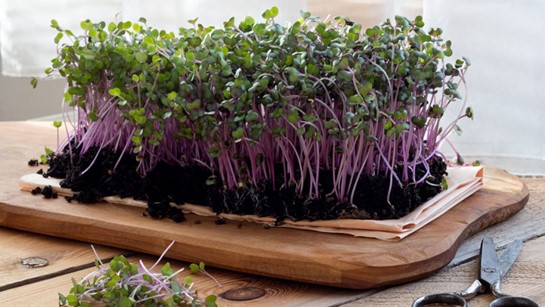Power Plants for Healing
15 Nov 2019
AN INTERVIEW WITH IAN GARRARD
Research scientist validates health benefits of broccoli sprouts and eating a plant-based diet.
BY ANNA MARIA CLEMENT, PhD, LN
While speaking in Warsaw, Poland, we met a wonder-ful woman, Monika Garrard. She spoke to us about her husband, Ian, a research scientist working extensively on the positive health benefits of broccoli sprouts. We asked her if it would be appropriate that we interview him for an upcoming issue of our magazine, and they agreed. Here is amazing information that scientifically validates what we have known here at Hippocrates since 1956.
Anna Maria Clement: Please describe your involvement with the broccoli research.
Ian Garrard: I was manager of the Bioprocessing Centre at Brunel University from its opening in April 2005 until 2016. In 2005, we were contacted by Dr. Edward Chou, of Pharma-Tech Research Corp., and Professor Jed Fahey, of Johns Hopkins University in Baltimore. They were trying to separate a compound from broccoli called glucoraphanin, a hydrophilic thioglucoside N-hydroxy-sulphate, which was known to have chemoprotective and antibiotic properties. The compound is found in all cruciferous plants but much more is present in broccoli, especially in the seeds.
They were interested in purifying enough to perform some medical trials (meaning up to a kilo of purified compound), though I understand these trials were limited so the compound is not a full pharmaceutical but can only be sold as a health supplement. The purification of this compound was tricky due to its hydrophilicity and the fact that an extremely similar compound, called glucoiberin, was also produced in large quantities. Glucoiberin is very similar in structure to glucoraphanin, with the only difference being a single carbon atom in the side chain.
Thus, despite over a year of using traditional separation techniques (mainly HPLC), they had not been able to purify out the glucoraphanin. In the Bioprocessing Centre which I managed, we used a novel technique called counter-current chromatography, which uses a liquid-liquid technique of separation. We were able to separate these two compounds and purified first 50 grams and then over a kilogram of glucoraphanin, which we passed on to Johns Hopkins University so their trials could commence.
A.C.: What was the most interesting finding?
I.G.: All glucosinolates are converted by an enzyme in the broccoli to isothio-cyantes, of which the most significant is sulphoraphane, which is an antibiotic. The plant uses this as a protection mechanism against insects, which are repelled by isothiocyanates being released, but fortunately for us, we can also benefit as the compounds have therapeutic uses. In particular, the glucosinolate called glucoraphanin has been shown to have chemo-protective properties, meaning it may help prevent cancer tumors from developing.
A.C.: What amount of broccoli sprouts do you think a person should consume daily for the prevention of cancer and/or when enduring cancer?
I.G.: Cooking broccoli will largely destroy the enzyme myrosinase and this is necessary to convert the glucoraphanin into sulphoraphane, so ideally the broccoli needs to be consumed raw. Also, the older the plant, the less glucoraphanin is present, so ideally, fresh young sprouts ought to be eaten. As to how much, around 2 to 3 ounces per day for those suffering the disease and at least 1 ounce for prevention.
A.C.: Do you think there is an advantage, when one has active cancer, to juice larger amounts and drink it immediately?
I.G.: I think that would be helpful. Personally, I would recommend anyone with active cancer to immediately switch to a plant-based diet with as many raw vegetables and salads as possible. That would certainly have a more positive effect than a disease-promoting processed food diet. In fact, I recommend this diet to anyone, as it is much easier to prevent cancer with a plant-based diet than to cure it once it has started.
A.C.: Who funded this study, what was their interest, and what has come of the research?
I.G.: Johns Hopkins University funded the study and they created a spinout company, Brassica Protection Products, which sells broccoli extract in health food shops. Personally, I would prefer to eat my broccoli. The “gluco” part of the glucosinolates name refers to the glucose moiety in the molecule and this makes broccoli quite a sweet-tasting vegetable. That is why children can be more readily persuaded to eat broccoli than Brussels sprouts.
A.C.: If you had one thing to tell the public as a scientist, what would it be?
I.G.: Eat plants. Lots of them. Meat consumption every day seems to be associated with more and more Western afflictions, such as cancer, Alzheimer’s, and heart disease. It doesn’t take long to get used to healthy food and soon, you really start enjoying it, preferring salads and vegetables to other sweet, fatty, or meaty foods. That has got to be good news.